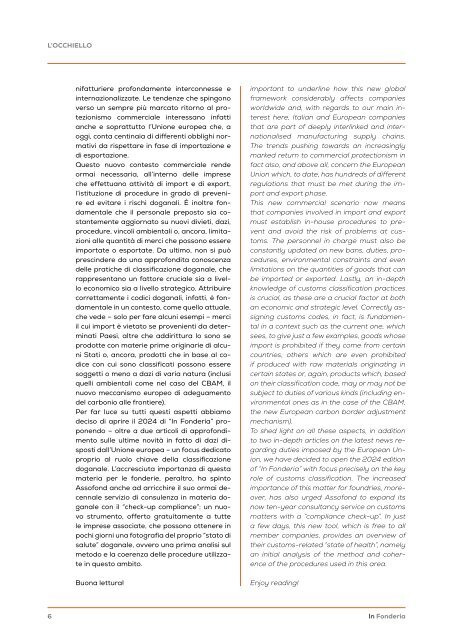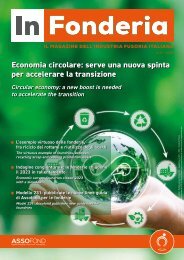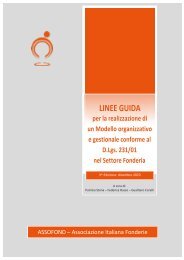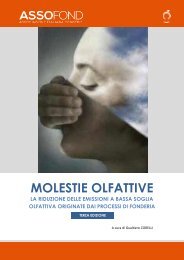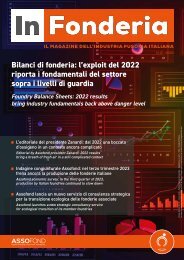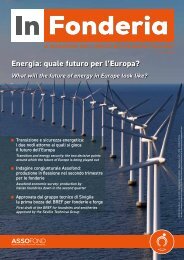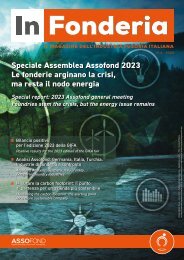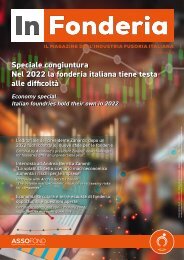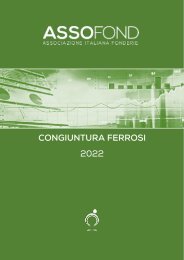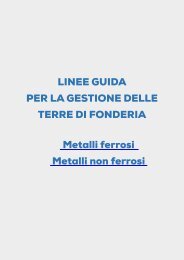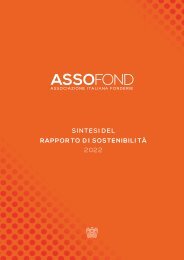In Fonderia 1 2024
Primo numero del 2024 di In Fonderia
Primo numero del 2024 di In Fonderia
Create successful ePaper yourself
Turn your PDF publications into a flip-book with our unique Google optimized e-Paper software.
L’OCCHIELLO<br />
nifatturiere profondamente interconnesse e<br />
internazionalizzate. Le tendenze che spingono<br />
verso un sempre più marcato ritorno al protezionismo<br />
commerciale interessano infatti<br />
anche e soprattutto l’Unione europea che, a<br />
oggi, conta centinaia di differenti obblighi normativi<br />
da rispettare in fase di importazione e<br />
di esportazione.<br />
Questo nuovo contesto commerciale rende<br />
ormai necessaria, all’interno delle imprese<br />
che effettuano attività di import e di export,<br />
l’istituzione di procedure in grado di prevenire<br />
ed evitare i rischi doganali. È inoltre fondamentale<br />
che il personale preposto sia costantemente<br />
aggiornato su nuovi divieti, dazi,<br />
procedure, vincoli ambientali o, ancora, limitazioni<br />
alle quantità di merci che possono essere<br />
importate o esportate. Da ultimo, non si può<br />
prescindere da una approfondita conoscenza<br />
delle pratiche di classificazione doganale, che<br />
rappresentano un fattore cruciale sia a livello<br />
economico sia a livello strategico. Attribuire<br />
correttamente i codici doganali, infatti, è fondamentale<br />
in un contesto, come quello attuale,<br />
che vede – solo per fare alcuni esempi – merci<br />
il cui import è vietato se provenienti da determinati<br />
Paesi, altre che addirittura lo sono se<br />
prodotte con materie prime originarie di alcuni<br />
Stati o, ancora, prodotti che in base al codice<br />
con cui sono classificati possono essere<br />
soggetti o meno a dazi di varia natura (inclusi<br />
quelli ambientali come nel caso del CBAM, il<br />
nuovo meccanismo europeo di adeguamento<br />
del carbonio alle frontiere).<br />
Per far luce su tutti questi aspetti abbiamo<br />
deciso di aprire il <strong>2024</strong> di “<strong>In</strong> <strong>Fonderia</strong>” proponendo<br />
– oltre a due articoli di approfondimento<br />
sulle ultime novità in fatto di dazi disposti<br />
dall’Unione europea – un focus dedicato<br />
proprio al ruolo chiave della classificazione<br />
doganale. L’accresciuta importanza di questa<br />
materia per le fonderie, peraltro, ha spinto<br />
Assofond anche ad arricchire il suo ormai decennale<br />
servizio di consulenza in materia doganale<br />
con il “check-up compliance”: un nuovo<br />
strumento, offerto gratuitamente a tutte<br />
le imprese associate, che possono ottenere in<br />
pochi giorni una fotografia del proprio “stato di<br />
salute” doganale, ovvero una prima analisi sul<br />
metodo e la coerenza delle procedure utilizzate<br />
in questo ambito.<br />
Buona lettura!<br />
important to underline how this new global<br />
framework considerably affects companies<br />
worldwide and, with regards to our main interest<br />
here, Italian and European companies<br />
that are part of deeply interlinked and internationalised<br />
manufacturing supply chains.<br />
The trends pushing towards an increasingly<br />
marked return to commercial protectionism in<br />
fact also, and above all, concern the European<br />
Union which, to date, has hundreds of different<br />
regulations that must be met during the import<br />
and export phase.<br />
This new commercial scenario now means<br />
that companies involved in import and export<br />
must establish in-house procedures to prevent<br />
and avoid the risk of problems at customs.<br />
The personnel in charge must also be<br />
constantly updated on new bans, duties, procedures,<br />
environmental constraints and even<br />
limitations on the quantities of goods that can<br />
be imported or exported. Lastly, an in-depth<br />
knowledge of customs classification practices<br />
is crucial, as these are a crucial factor at both<br />
an economic and strategic level. Correctly assigning<br />
customs codes, in fact, is fundamental<br />
in a context such as the current one, which<br />
sees, to give just a few examples, goods whose<br />
import is prohibited if they come from certain<br />
countries, others which are even prohibited<br />
if produced with raw materials originating in<br />
certain states or, again, products which, based<br />
on their classification code, may or may not be<br />
subject to duties of various kinds (including environmental<br />
ones as in the case of the CBAM,<br />
the new European carbon border adjustment<br />
mechanism).<br />
To shed light on all these aspects, in addition<br />
to two in-depth articles on the latest news regarding<br />
duties imposed by the European Union,<br />
we have decided to open the <strong>2024</strong> edition<br />
of “<strong>In</strong> <strong>Fonderia</strong>” with focus precisely on the key<br />
role of customs classification. The increased<br />
importance of this matter for foundries, moreover,<br />
has also urged Assofond to expand its<br />
now ten-year consultancy service on customs<br />
matters with a “compliance check-up”. <strong>In</strong> just<br />
a few days, this new tool, which is free to all<br />
member companies, provides an overview of<br />
their customs-related “state of health”, namely<br />
an initial analysis of the method and coherence<br />
of the procedures used in this area.<br />
Enjoy reading!<br />
6 <strong>In</strong> <strong>Fonderia</strong>


